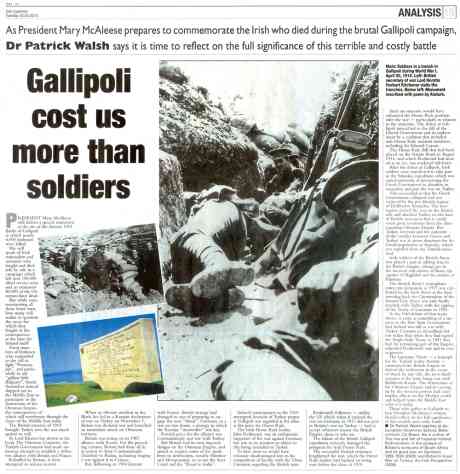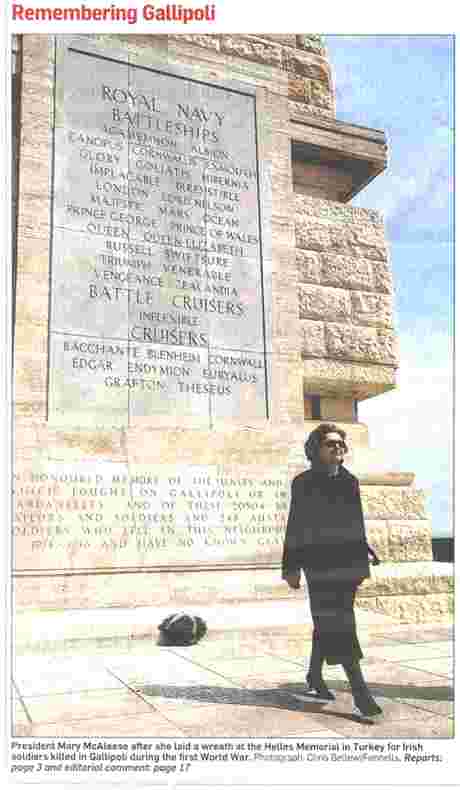Commemoration and celebration? The Irish who invaded Turkey in Britain's war in British uniform
 national |
anti-war / imperialism |
other press
national |
anti-war / imperialism |
other press
 Thursday March 25, 2010 12:52
Thursday March 25, 2010 12:52 by Pat Walsh - Irish Examiner
by Pat Walsh - Irish Examiner

Was it 'better to die 'neath an Irish sky Than at Suvla or Sud el Bar' ('The Foggy Dew')
Gallipoli cost us more than soldiers
Irish Examiner 23 march 2010
As President Mary McAleese prepares to commemorate the Irish who died during the brutal Gallipoli campaign, Dr Patrick Walsh says it is time to reflect on the full significance of this terrible and costly battle
PRESIDENT Mary McAleese will deliver a speech tomorrow at the site of the famous 1915 Battle of Gallipoli at which nearly 4,000 Irishmen were killed.
She will speak of Irish nationalists and unionists who fought and died side by side in a campaign which left over 150,000 allied service men and an estimated 80,000 of the Ottoman force dead.
But while commemorating all those brave men, how many will realise or question the cause for which they fought or the consequences at the time for Ireland itself?

Pat Walsh Irish Examiner 23 March 2010 - Irish Soldiers in British uniform fight and die for British interests
Great numbers of Irishmen who responded to the call to fight 'Prussianism', and particularly to aid 'gallant little Belgium', found themselves instead shipped out to the Middle East to participate in the destruction of the Ottoman Empire, the consequences of which still reverberate through the chaos of the Middle East today.
The British invasion of 1914 brought Turkey into the war much against its will.
As Lord Kinross has shown in his book The Ottoman Centuries, the Turkish Government had made numerous attempts to establish a defensive alliance with Britain and France.
Rebuffed by Britain, it then attempted to remain neutral.
When an obscure incident in the Black Sea led to a Russian declaration of war on Turkey on November 5, Britain too declared war and launched an immediate attack on Ottoman territory.
Britain was acting on its 1907 alliance with Russia. For the preceding century, Britain had done all in its power to deny Constantinople (Istanbul) to Russia, including waging a war against it in Crimea.
But, following its 1904 Entente with France, British strategy had changed to one of preparing to engage the new 'threat', Germany, in a war on two fronts, a strategy in which the Russian 'steamroller' was key.
Russia's price for the alliance was Constantinople and war with Turkey.
But Britain had its own imperial designs on the Ottoman Empire, and aimed to acquire some of the spoils from its destruction, notably Palestine and Mesopotamia, to secure the Suez Canal and the 'Road to India'.
Ireland's participation in the 1915 attempted invasion of Turkey proper at Gallipoli was regarded at the time as the price for Home Rule.
The Irish Home Rule leader, John Redmond, was an enthusiastic supporter of the war against Germany but was in no position to object to this being extended to Turkey.
To have done so would have seriously disadvantaged him in his competition of loyalty with the Ulster Unionists regarding the British state.
Redmond¹s followers, unlike the US which when it entered the war on Germany in 1917 did not join in Britain¹s war on Turkey, had to accept whatever enemy the British Empire chose to take on.
The failure of the British Gallipoli expedition seriously damaged the prospects for Irish Home Rule.
The successful Turkish resistance lengthened the war, which the Home Rule leaders had banked on being over before the close of 1915.
Such an outcome would have enhanced the Home Rule position after the war, particularly in relation to the unionists. The defeat at Gallipoli instead led to the fall of the Liberal Government and its replacement by a coalition that included anti-Home Rule unionist ministers, including Sir Edward Carson.
The Home Rule Bill that had been placed on the Statute Book in August 1914, and which Redmond had treated as an act, was rendered still-born.
After the defeat at Gallipoli, Irish soldiers were transferred to take part in the Salonika expedition which was aimed primarily at pressurising the Greek Government to abandon its neutrality and join the war on Turkey.
This succeeded in that the Greek Government collapsed and was replaced by the pro-British regime of Eleftherios Venizelos. The new regime joined the war on the British side and attacked Turkey on the basis of British assurances that it could wrest great territories from the disintegrating Ottoman Empire. But Turkey survived and the outcome of the conflict between Greece and Turkey was to prove disastrous for the Greek population of Anatolia, which was expelled from the Turkish mainland.
Irish soldiers of the British Army also played a part in adding Iraq to the British Empire, taking part in the invasion and seizure of Basra, the capture of Baghdad and the seizure of Palestine.
The British Army¹s triumphant entry into Jerusalem in 1917 was celebrated by the Irish News as the final wresting back for Christendom of the Eternal City. Peace was only finally reached with Turkey with the signing of the Treaty of Lausanne in 1923.
As the Dáil debate of that treaty shows, it came as something of a surprise to the Free State Government that Ireland was still at war with Turkey. Cumann na nGaedheal did not realise that when they had signed the Anglo-Irish Treaty in 1921 they had, by remaining part of the Empire, inherited Redmond¹s war and its consequences.
The Lausanne Treaty, a triumph for the Turkish leader Ataturk, committed the British Empire to defend the settlement in the event of attack by any side, the most likely scenario at the time being war with Bolshevik Russia. The destruction of the Ottoman Empire and its carving up by the western powers had catastrophic effects on the Muslim world and helped make the Middle East what it is today.
Those who gather at Gallipoli to hear President McAleese¹s oration should reflect on the full significance of this terrible and costly battle.
Dr Patrick Walsh teaches at Assumption Grammar School, Ballynahinch, Co Down. He is author of The rise and fall of Imperial Ireland: Redmondism in the context of Britain's conquest of South Africa and its great war on Germany 1899-1916 (2003) and Britain's Great War on Turkey: An Irish Perspective (2009).

President Mary McAleese Irish Times 25 March 2010 - celebrates imperial sacrifice
 national |
anti-war / imperialism |
other press
national |
anti-war / imperialism |
other press
 Thursday March 25, 2010 12:52
Thursday March 25, 2010 12:52 by Pat Walsh - Irish Examiner
by Pat Walsh - Irish Examiner





![[Dublin] National Demonstration: Freedom for Palestine - End Gaza Genocide - Sanctions Now! nat_demo_palestine_feb17.jpg](../cache/imagecache/local/attachments/feb2024/72_54_1_1_5_0_0_0_0_0_nat_demo_palestine_feb17.jpg)



















 printable version
printable version

 Digg this
Digg this del.icio.us
del.icio.us Furl
Furl Reddit
Reddit Technorati
Technorati Facebook
Facebook Gab
Gab Twitter
Twitter
View Comments Titles Only
save preference
Comments (1 of 1)
Jump To Comment: 1Interesting history by Dr. Walsh, but I fail to see anything objectionable in the President's behaviour at Gallipoli. All she did was expressed
condolences for the Irish men from both sides of the religious division who perished in the battle. She did not make any
Kevin Myers-style attempts to glorify British Imperial Militarism .
She also visited the Monument of the Martyrs, which commenorates Turkish soldiers who were killed in the conflict.
http://www.independent.ie/national-news/forgotten-no-mo....html